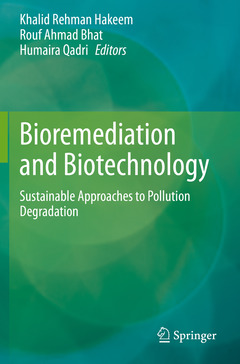Bioremediation and Biotechnology, 1st ed. 2020 Sustainable Approaches to Pollution Degradation
Coordonnateurs : Hakeem Khalid Rehman, Bhat Rouf Ahmad, Qadri Humaira

Toxic substances threatens aquatic and terrestrial ecosystems and ultimately human health. The book is a thoughtful effort in bringing forth the role of biotechnology for bioremediation and restoration of the ecosystems degraded by toxic and heavy metal pollution. The introductory chapters of the book deal with the understanding of the issues concerned with the pollution caused by toxic elements and heavy metals and their impacts on the different ecosystems followed by the techniques involved in monitoring of the pollution. These techniques include use of bio-indicators as well as modern techniques for the assessment and monitoring of toxicants in the environment. Detailed chapters discussing the role of microbial biota, aquatic plants, terrestrial plants to enhance the accumulation efficiency of these toxic and heavy metals are followed by remediation techniques involving myco-remediation, bio-pesticides, bio-fertilizers, phyto-remediation and rhizo-filtration. A sizable portion of the book has been dedicated to the advanced bio-remediation techniques which are finding their way from the laboratory to the field for revival of the degraded ecosystems. These involve bio-films, micro-algae, genetically modified plants and filter feeders. Furthermore, the book is a detailed comprehensive account for the treatment technologies from unsustainable to sustainable. We believe academicians, researchers and students will find this book informative as a complete reference for biotechnological intervention for sustainable treatment of pollution.
1. Environmental Pollution and its impact on biota
2. Introduction to Bioremediation
3. Aquatic biota: a viable bio-indicator of pollution stress
4. Bio-monitoring and bioremediation by way of filter feeders
5. Biofilms: Sustainable technology for aquatic pollution remediation
6. Microbial biota for degradation of persistent pollutants
7. Biopesticides: clean sustainable technology for healthy environment
8. Application of biotechnology for restoration of degraded environments
9. Vermicomposting: a sustainable tool for degradation of waste pollution
10. Role of Salix alba for cleaning up the toxic metal pollution
11. Bio-fertilizers: Sustainable approach for plant and soil environment12. Micro-algae for abatement of aquatic pollution
13. Application of macrophytes as sustainable technique for cleaning of polluted environs
14. Phytoremediation: an ecofriendly approach for restoration of polluted environs
15. Pollution remediation by way of using genetically modified plants (GMP).
16. Bioreactors: a viable technology for pollution management
17. Rhizofiltration: a tool for cleaning the pollution
18. Aligator weed as a phytoremediant19. Myco-remediation: a sustainable approach for pollution abatement
20. Environmental biotechnology, a sustainable way to achieve pollution free environment.
Khalid Rehman Hakeem (Ph.D.) is Professor at King Abdulaziz University, Jeddah, Saudi Arabia. After completing his doctorate (Botany; specialization in Plant Eco-physiology and Molecular Biology) from Jamia Hamdard, New Delhi, India, in 2011, he worked as a lecturer at the University of Kashmir, Srinagar, for a short period. Later, he joined Universiti Putra Malaysia, Selangor, Malaysia, and worked there as Postdoctorate Fellow in 2012 and Fellow Researcher (Associate Professor) from 2013 to 2016. Dr. Hakeem has more than 10 years of teaching and research experience in plant eco-physiology, biotechnology and molecular biology, medicinal plant research, plant-microbe-soil interactions as well as in environmental studies. He is the recipient of several fellowships at both national and international levels; also, he has served as the visiting scientist at Jinan University, Guangzhou, China. Currently, he is involved with a number of international research projects with different government organizations. So far, Dr. Hakeem has authored and edited more than 35 books with international publishers, including Springer Nature, Academic Press (Elsevier), and CRC Press. He also has to his credit more than 85 research publications in peer-reviewed international journals and 60 book chapters in edited volumes with international publishers. At present, Dr. Hakeem serves as an editorial board member and reviewer of several high-impact international scientific journals from Elsevier, Springer Nature, Taylor and Francis, Cambridge, and John Wiley Publishers. He is included in the advisory board of Cambridge Scholars Publishing, UK. He is also a fellow of Plantae group of the American Society of Plant Biologists, member of the World Academy of Sciences, member of the International Society for Development and Sustainability, Japan, and member of Asian Federation of Biotechnology, Korea. Dr. Hakeem has been listed in Marquis Who’s Who in the World, since 2014–2019. Currentl
Latest research on environmental toxicity
Novel solutions to current bioremediation challenges
Contributed by an international panel of field scientists and lab researchers
Date de parution : 01-2021
Ouvrage de 327 p.
15.5x23.5 cm
Disponible chez l'éditeur (délai d'approvisionnement : 15 jours).
Prix indicatif 158,24 €
Ajouter au panierDate de parution : 01-2020
Ouvrage de 327 p.
15.5x23.5 cm
Disponible chez l'éditeur (délai d'approvisionnement : 15 jours).
Prix indicatif 158,24 €
Ajouter au panier


